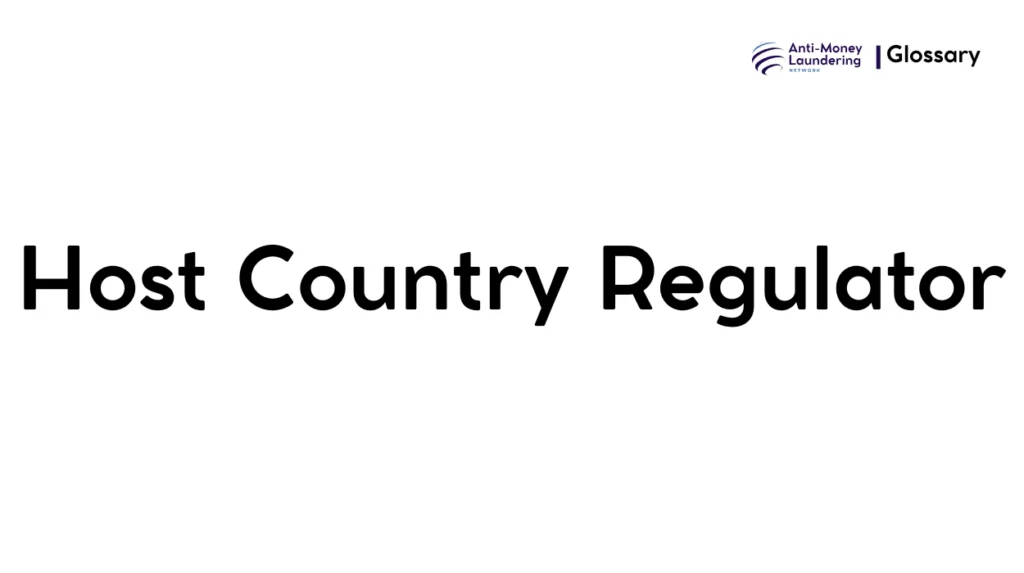Definition
A Host Country Regulator is the national or regional authority responsible for supervising and enforcing AML standards for financial institutions and entities operating within its territory, including branches or subsidiaries of foreign institutions. Its role is grounded in the country’s AML legal framework and reflects international standards such as those set by the Financial Action Task Force (FATF).
Purpose and Regulatory Basis
The Host Country Regulator plays a pivotal role in the global AML regime. Financial entities often operate cross-border through branches or subsidiaries. Each host country regulator ensures that these entities comply with local AML requirements designed to:
- Detect and prevent money laundering and terrorist financing activities within their borders
- Enforce international AML standards and local regulations
- Protect the financial system’s integrity and national security
Key regulatory frameworks influencing host country regulators include:
- FATF Recommendations: Providing global AML/CFT (combating the financing of terrorism) standards that host countries implement nationally.
- USA PATRIOT Act: Especially Section 311, enabling the U.S. to target financial institutions abroad linked to money laundering.
- European Union Money Laundering Directives (AMLD): Mandate compliance measures for EU member states’ regulators.
Host country regulators translate these frameworks into national laws and supervisory regimes, tailoring them to local conditions but aligned with global best practices.
When and How it Applies
This term becomes relevant whenever a financial institution or designated non-financial business operates outside its home country, such as:
- Branches of a foreign bank in another jurisdiction
- Subsidiaries of multinational financial corporations
- Cross-border transactions monitored under local AML laws
For example, a U.S.-based bank’s branch in France is subject to AML oversight by the French financial regulator as its host country regulator. This regulator mandates compliance with French AML laws and EU directives.
Types or Variants
While the overarching role is similar, the structure and extent of AML regulation by host country regulators vary by jurisdiction:
- Central Banks: Often act as AML regulators for banks and financial institutions.
- Financial Supervisory Authorities: Specialized agencies regulating securities, insurance, and other financial sectors.
- Multi-agency frameworks: Some countries deploy cross-sectoral regulators or committees overseeing AML compliance.
Each may have different supervisory powers, enforcement mechanisms, and reporting requirements tailored to their financial landscape.
Procedures and Implementation
Financial institutions under a host country regulator must:
- Identify Applicable Laws: Understand local AML legislation and international obligations.
- Implement AML Controls: Establish policies, procedures, and internal controls to detect and deter money laundering.
- Customer Due Diligence (CDD): Perform due diligence per local standards including enhanced due diligence for high-risk customers.
- Ongoing Monitoring: Track transactions and client behavior for suspicious activity.
- Reporting Obligations: File suspicious activity reports (SARs) and other regulatory reports as mandated.
- Compliance Reviews: Regular internal audits and independent reviews to ensure control effectiveness.
Institutions may need to customize global AML frameworks to satisfy host country-specific requirements, often coordinating with home country regulators.
Impact on Customers/Clients
From the customer perspective, host country regulators influence:
- KYC Requirements: Local AML rules might demand additional verification, affecting onboarding processes.
- Restricted Transactions: Certain transactions might be blocked or flagged due to local regulations.
- Rights and Obligations: Customers have rights to privacy but also face controls designed to prevent illicit activity.
This means customers may experience varied AML standards depending on the operating country of their financial institution.
Duration, Review, and Resolution
- Duration: AML compliance is ongoing while the institution operates within the host country.
- Review Process: Regulatory authorities conduct periodic assessments, onsite examinations, and risk evaluations.
- Resolution: Regulatory findings may lead to enforcement actions, including fines, sanctions, or license revocations if compliance is insufficient.
Institutions must maintain continuous AML vigilance and adapt as regulatory expectations evolve.
Reporting and Compliance Duties
Host country regulators require institutions to:
- Maintain comprehensive records of customer identification and transactions
- Submit timely suspicious activity reports
- Adhere to AML training and awareness programs
- Cooperate with regulatory inspections and investigations
Penalties for non-compliance may include financial fines, operational restrictions, or criminal charges.
Related AML Terms
- Home Country Regulator: The country where the parent institution is headquartered.
- Correspondent Banking: Relationships monitored under both host and home regulations.
- Enhanced Due Diligence (EDD): Often required by host regulators for higher-risk clients.
Understanding the interplay of these terms is crucial for effective global AML compliance.
Challenges and Best Practices
Challenges include:
- Navigating conflicting regulations between host and home countries
- Managing multiple regulator expectations and reporting requirements
- Adapting systems to local AML risk patterns
Best practices:
- Establish clear communication channels between home and host compliance teams
- Develop flexible AML frameworks accommodating local nuances
- Leverage technology for scalable monitoring and reporting
- Engage regularly with regulators to stay abreast of regulatory changes
Recent Developments
Recent trends affecting host country regulators include:
- Technological Advances: Use of AI and big data analytics to enhance AML detection.
- International Cooperation: Increased information sharing among regulators.
- Stronger Enforcement: Heightened penalties for non-compliant multinational entities.
- Expanded Scope: Inclusion of virtual assets and fintech under AML regimes.
Host country regulators are thus evolving rapidly to address emerging money laundering techniques.
The Host Country Regulator is a cornerstone in the AML framework for multinational financial entities, ensuring adherence to local and international standards to mitigate the risk of money laundering and terrorist financing. Compliance with host country regulations requires institutions to adapt and maintain robust AML controls tailored to local laws, ultimately safeguarding the integrity of the global financial system.

